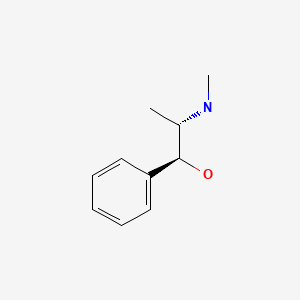Attribution Statement: LactMed is a registered trademark of the U.S. Department of Health and Human Services.
NCBI Bookshelf. A service of the National Library of Medicine, National Institutes of Health.
Drugs and Lactation Database (LactMed®) [Internet]. Bethesda (MD): National Institute of Child Health and Human Development; 2006-.
CASRN: 90-82-4

Drug Levels and Effects
Summary of Use during Lactation
Although the small amounts of pseudoephedrine in breastmilk are unlikely to harm the nursing infant, it may cause irritability occasionally. A single dose of pseudoephedrine decreases milk production acutely and repeated use seems to interfere with lactation. Mothers with newborns whose lactation is not yet well established or in mothers who are having difficulties producing sufficient milk should not receive pseudoephedrine. A treatment scheme has been reported for mothers with hypergalactia that uses pseudoephedrine to decrease milk supply.[1]
Drug Levels
Maternal Levels. A single oral dose of 60 mg of pseudoephedrine in 3 women resulted in peak milk levels of less than 1 mg/L 1 hour after the dose.[2] Other authors used data from this study to calculate the amount excreted in milk to be 5.5% of the weight-adjusted maternal dosage.[3]
After a 60 mg oral dose of immediate-release pseudoephedrine, peak milk levels averaging 698 mcg/L occurred 1.7 hours after the dose and half-life in milk was 5.5 hours. A fully breast-fed infant would receive a dose of 4.3% (range 2.2 to 6.7%) of the maternal weight-adjusted dose.[3]
Infant Levels. Relevant published information was not found as of the revision date.
Effects in Breastfed Infants
Mothers reported irritability was reported in 20% of infants exposed to pseudoephedrine in one study of breastfeeding mothers.[4]
All adverse reactions in breastfed infants reported in France between January 1985 and June 2011 were compiled by a French pharmacovigilance center. Of 174 reports, pseudoephedrine was reported to cause adverse reactions in 4 infants, primarily agitation.[5]
Effects on Lactation and Breastmilk
After a single dose of pseudoephedrine 60 mg orally in 8 nursing mothers, there was a mean 24% decrease in milk production over the following 24 hours. No change in blood flow to the breast was detected that could explain the decreased milk production; there was a 13.5% decrease in serum prolactin after pseudoephedrine, but this change did not achieve statistical significance. Oxytocin levels were not measured.[3]
Alternate Drugs to Consider
References
- 1.
- Johnson HM, Eglash A, Mitchell KB, et al. ABM Clinical Protocol #32: Management of hyperlactation. Breastfeed Med. 2020;15:129–34. [PubMed: 32031417]
- 2.
- Findlay JW, Butz RF, Sailstad JM, et al. Pseudoephedrine and triprolidine in plasma and breast milk of nursing mothers. Br J Clin Pharmacol. 1984;18:901–6. [PMC free article: PMC1463694] [PubMed: 6529531]
- 3.
- Aljazaf K, Hale TW, Ilett KF, et al. Pseudoephedrine: effects on milk production in women and estimation of infant exposure via breastmilk. Br J Clin Pharmacol. 2003;56:18–24. [PMC free article: PMC1884328] [PubMed: 12848771]
- 4.
- Ito S, Blajchman A, Stephenson M, et al. Prospective follow-up of adverse reactions in breast-fed infants exposed to maternal medication. Am J Obstet Gynecol. 1993;168:1393–9. [PubMed: 8498418]
- 5.
- Soussan C, Gouraud A, Portolan G, et al. Drug-induced adverse reactions via breastfeeding: A descriptive study in the French Pharmacovigilance Database. Eur J Clin Pharmacol. 2014;70:1361–6. [PubMed: 25183382]
Substance Identification
Substance Name
Pseudoephedrine
CAS Registry Number
90-82-4
Drug Class
Breast Feeding
Adrenergic Agents
Adrenergic Alpha-Agonists
Central Nervous System Stimulants
Sympathomimetics
Vasoconstrictor Agents
Disclaimer: Information presented in this database is not meant as a substitute for professional judgment. You should consult your healthcare provider for breastfeeding advice related to your particular situation. The U.S. government does not warrant or assume any liability or responsibility for the accuracy or completeness of the information on this Site.
- User and Medical Advice Disclaimer
- Drugs and Lactation Database (LactMed) - Record Format
- LactMed - Database Creation and Peer Review Process
- Fact Sheet. Drugs and Lactation Database (LactMed)
- Drugs and Lactation Database (LactMed) - Glossary
- LactMed Selected References
- Drugs and Lactation Database (LactMed) - About Dietary Supplements
- Breastfeeding Links
- PMCPubMed Central citations
- PubChem SubstanceRelated PubChem Substances
- PubMedLinks to PubMed
- Review Phenylephrine.[Drugs and Lactation Database (...]Review Phenylephrine.. Drugs and Lactation Database (LactMed®). 2006
- (1S,2S)-1-Methylamino-1-phenyl-2-chloropropane: Route specific marker impurity of methamphetamine synthesized from ephedrine via chloroephedrine.[Forensic Sci Int. 2012](1S,2S)-1-Methylamino-1-phenyl-2-chloropropane: Route specific marker impurity of methamphetamine synthesized from ephedrine via chloroephedrine.Ko BJ, Suh S, Suh YJ, In MK, Kim SH, Kim JH. Forensic Sci Int. 2012 Sep 10; 221(1-3):92-7. Epub 2012 May 2.
- Review Methamphetamine.[Drugs and Lactation Database (...]Review Methamphetamine.. Drugs and Lactation Database (LactMed®). 2006
- Review Dexchlorpheniramine.[Drugs and Lactation Database (...]Review Dexchlorpheniramine.. Drugs and Lactation Database (LactMed®). 2006
- Review Tripelennamine.[Drugs and Lactation Database (...]Review Tripelennamine.. Drugs and Lactation Database (LactMed®). 2006
- Pseudoephedrine - Drugs and Lactation Database (LactMed®)Pseudoephedrine - Drugs and Lactation Database (LactMed®)
Your browsing activity is empty.
Activity recording is turned off.
See more...
